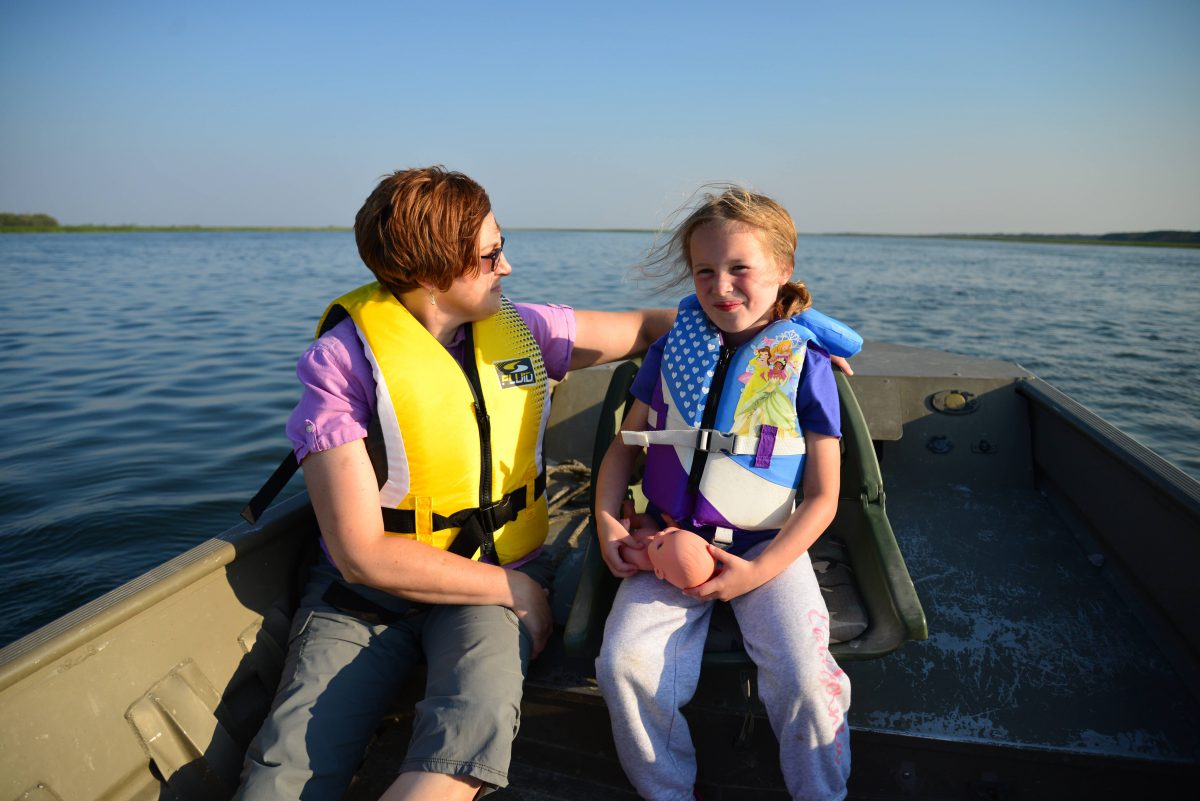In the small Manitoba community of Waterhen, population 169, Jon and Karissa Warkentin are fighting for the right to stay in Canada and run their business.

“It had always been our dream to someday have a business of our own,” Jon said. “We wanted a community too, a place for our kids to go to school, so that they could have friends … And this place almost checked off all of the boxes.”
WATCH: Canada’s controversial immigration policy regarding the disabled is once again in the spotlight

Originally from Colorado, Jon, his wife and their four kids settled in Waterhen in 2013.
They bought the Harvest Lodge, roughly four hours north of Winnipeg, and have since invested tens of thousands of dollars into the business which caters to deer and duck hunters and anglers looking to catch walleye and pike. They also employ four people part-time on a seasonal basis.
“There are a lot of places in the States when you go to a public hunting area and it’s literally like a parking lot,” he told Global News. “People want to come here and get away from the busyness of their life and see what real wilderness is really like, and we have that, and that’s what’s exciting. It’s just a beautiful country.”
But their dream could be shattered after Immigration, Refugees and Citizenship Canada denied the family’s application for permanent residency because their 6-year-old daughter, Karalynn, has an intellectual disability.
Known as “medical inadmissibility” Immigration Canada says Karalynn’s condition would place “excessive demand” upon the province’s publicly-funded education system. As a result, the entire family’s application for permanent residency has been denied.
Global News reached out to the federal government for comment but was told by a spokesperson for Immigration Minister Ahmed Hussen that the minister was travelling overseas and unavailable for an interview. His office has, however, said the government is reviewing measures surrounding excessive demand and medical inadmissibility, but has not provided specific details on the scope of this review or when any changes might be announced.
WATCH: Canada rejects hundreds of immigrants based on incomplete data, Global News investigation finds

At the age of two, more than a year after Jon and Karissa purchased the hunting lodge, Karalynn was diagnosed with epilepsy following a series of seizures. She was placed on anti-seizure medication and has had no incidents during the past two years. But as Karalynn aged, the family began to notice she was developmentally delayed and had trouble speaking.
“The epilepsy never came up with immigration,” Jon said, referring to the reason their application was denied. “As far as medication goes, she’s not on any medication at all right now. She’s basically kind of grown out of that, which according to the neurologist, happens a lot with kids.”
In denying the family’s application, Immigration Canada said Karalynn was diagnosed with Global Developmental Delay and attention deficit hyperactivity disorder (ADHD), citing a report prepared by a school psychologist.
However, Global News reviewed this report and determined the psychologist did not, in fact, diagnose Karalynn with ADHD. Instead, he said she had developmental delay, generalized epilepsy and displayed signs of “possible ADHD.”
“A school psychologist that thought that maybe it was a possibility but she was never diagnosed with it,” Jon said. “He just made notes that that may be a possibility, not a diagnosis.”
Listen: Callers to Winnipeg’s 680 CJOB upset about choice to deny family’s application for permanent residency
What is excessive demand?
The Manitoba family has been caught up in a section of Canada’s immigration act designed to ensure newcomers to the country do not cause “excessive demand” on publicly funded health and social service programs. Immigration Canada sets the limit for “excessive demand” at $6,655 a year, the apparent average annual health and social service spending per Canadian. This means if the costs of caring for a person’s condition are higher than this limit, the applicant and all family members are denied permanent residency. If the costs are lower, and they’re an otherwise viable candidate, they’re let in.
Following a Global News investigation that revealed major flaws in the way Canadian immigration officials assess hundreds of applications each year, the Warkentins’ and nearly a dozen other families from across the country came forward to say they, too, have been affected by a policy that lawyers and experts have called “discriminatory.”
In some cases families were turned away because a child had autism or Down’s syndrome.
“I was shocked. Honestly, I felt sick. I was going between nausea, disbelief,” Karissa told Global News “Like what are we going to do? We’ve invested our life into this community and this business we love what we do. Our customers keep coming back, year after year, and our kids enjoy the lifestyle we have out here too. And I thought, it’s not like our daughter has excessive daily medical needs or nursing care, and I just thought this can’t be true.”
READ MORE: Canada’s immigration system discriminates against children with disabilities, say families
In a letter denying their permanent residency, immigration officials said Karalynn’s condition would be too “expensive” and a burden on provincial social services. The letter did not list any costs associated with additional care for Karalynn.
A Global investigation revealed the figures used by Immigration Canada to determine “excessive demand” and the denial of permanent residency does not accurately reflect the cost of providing health and social services in the country.
Global’s reporting found the government doesn’t accurately account for up to $40-billion in annual social service spending – or roughly $1,105 a year per Canadian. This means the $6,655 limit used to deny applicants should be at least $7,404 if all social service spending is accounted for accurately.
WATCH: Immigration lawyer says family is devastated after permanent residency application is denied

Immigration lawyer Alastair Clarke, who is representing the Warkertin’s, said the family has been devastated by the government’s decision to deny them permanent residency.
“We’re dealing with a six-year-old girl. We’re dealing with a family who uprooted themselves from Colorado in order to build a business in rural Manitoba. They have established themselves as part of the community up there, and they’re trying to build their business and develop the region,” Clarke said. “The little girl is devastated, she doesn’t understand what’s going on, they don’t know what they did wrong, and they are trying to deal with it the best they can.”
Clarke said immigration officials made several errors when assessing the family’s application, including not taking into account their contribution to the local economy and unfounded claims about excessive costs on the local school.
“They came through the Manitoba Provincial Nominee Program,” said Clarke. “They got a certificate from the province that basically says ‘We want you to come to Manitoba. We recognize your business acumen, we recognize your business experience, we recognize the investments you’re going to bring to this province.”
Community, school board support family

WATCH ABOVE: Manitoba school community supports Warkentin family
In support of their application, Jon and Karissa submitted letters to Immigration Canada from the local mayor, school principal and regional school board.
Reg Klassen, chief superintendent of Frontier School Division, told Global News that Karalynn’s presence at the school placed no additional burden on province’s education system.
“Quite simply, this child is in our school division and so therefore we educate this student regardless of any needs etc. It’s our job,” he said. “Whether this student is here or someplace else that won’t change our funding.”
According to Klassen, this is because special education funding in Manitoba is awarded on a “block” basis, meaning the overall budget will not change as a result of admitting an individual student.
WATCH: Advocates, community leaders react to investigation into ‘hugely flawed’ immigration system

Klassen also said it’s important to include all students in the classroom – regardless of ability.
“Inclusion in the classroom is, for me, not anything we are going to debate. We are simply going to include our students and help everybody understand the strengths and weaknesses that we as individual human beings bring to the classroom,” said Klassen. “My hope would be they are going to be able to stay and continue to contribute to our society and way of life.”
Canada a ‘welcoming’ nation
Statements made by Prime Minister Justin Trudeau – including those made on Parliament Hill during Canada 150 celebrations – speak of a nation open to everyone, a welcoming country where “diversity is our strength” and where we aspire to build a more “inclusive society.”
But families and disability advocates say the government has fallen short when it comes to honouring these commitments with respect to persons with disabilities. In fact, they say policies such as “excessive demand” and “medical inadmissibility” unfairly target persons with disabilities.
WATCH: Disability rights advocate says immigration policy ‘not inclusive’

Jenna Roy, a disability rights advocate, recently participated in the consultation process for the federal government’s proposed accessibility legislation. She says that while the government is seeking to be a world-leader in disability rights, there are still many laws in Canada that systematically discriminate against persons with disabilities. According to Roy, this includes the provisions around medical inadmissibility and excessive demand.
“You’re denied and told your burden is too large,” said Roy, who supports repealing excessive demand. “[You’re] then given the chance to appeal through a charity model process, to be seen as an acceptable burden … I don’t really think that’s a good message to be sending folks who want to come to Canada, where we’re preaching equality and inclusion.”
The Prime Minister’s Office refused to comment on this story. In an emailed statement, a spokesperson for Immigration Minister Ahmed Hussen said “a small number of applicants, about 0.2% each year, are found inadmissible due to excessive demand.”
“In response to the findings of the November 2015 Evaluation of the Health Screening and Notification Program, the Government of Canada has been conducting a full review of the excessive demand provision,” said spokesperson Hursh Jaswal. “This review is to ensure that excessive demand policy continues to facilitate immigration while protecting the health of Canadians and their health-care system. When the results of this review are finalized and the Government has determined a preferred direction, IRCC will proceed with that direction.”
Meanwhile, the Warkentins’ plans for expanding their business in Manitoba have been placed on hold while their future in Canada remains uncertain. The family is currently here on temporary working visas set to expire this November, at which point they could face deportation. The denial letter from Immigration Canada said six-year-old Karalynn’s inadmissibility could also extend to visiting Canada, and that she should “not attempt to enter Canada without seeking advice from a Canadian visa office.”
“It’s kind of hurtful. It’s kind of a little bit of a slap in the face where you just feel like you’re not good enough,” Jon said.
“I understand that immigration has their rules and they have to have policies, but this one seems completely outdated and unfair,” Karissa said. “Anybody that has somebody in their family with a developmental problem or behavioural problem says that’s not all of who they are, that’s not one-hundred percent of their being.”
–Video editing by Emanuela Campanella and Derek Heraldo
Have you been denied Permanent Residency due to a family member being deemed medically inadmissible? If yes, please contact Global News with your story.



























Comments